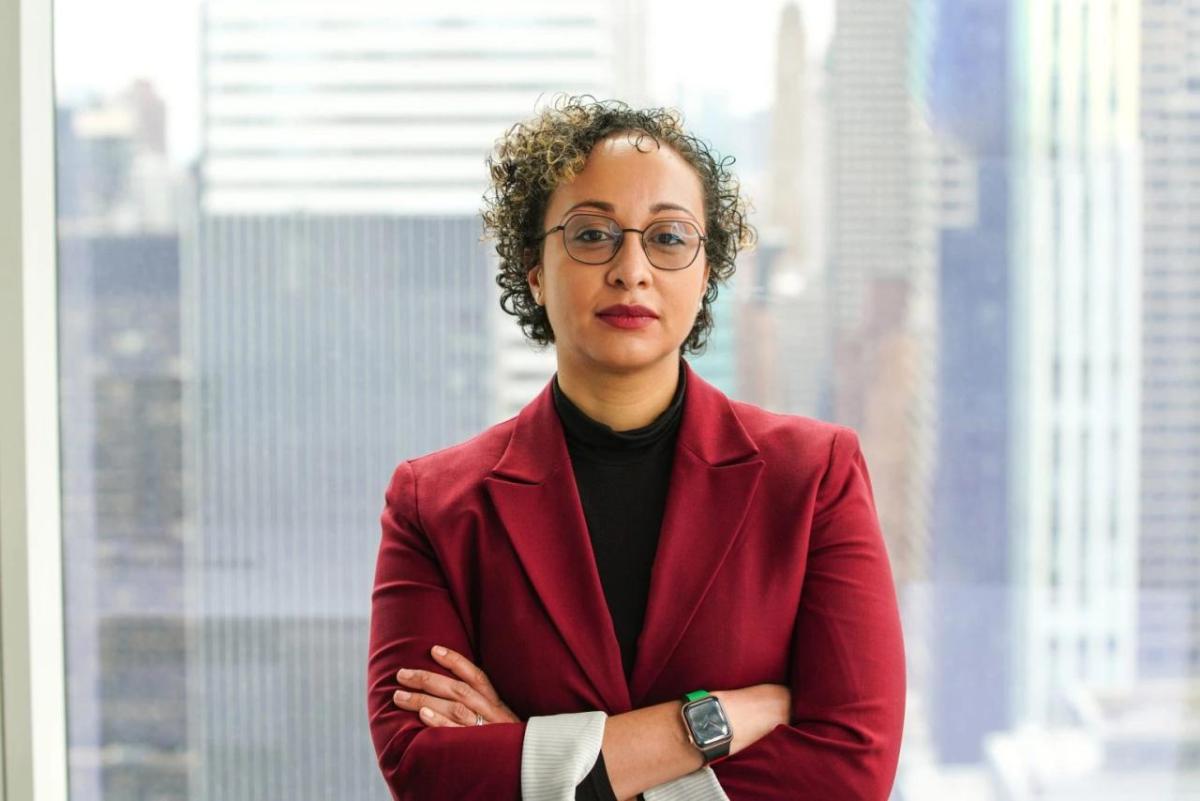Stacy-Marie Ishmael on Why Every Journalist Needs “A Really Good Group Text”

Originally published on bloomberg.com
For Stacy-Marie Ishmael, innate curiosity was the driving factor behind her pursuit of a career in journalism. Well, curiosity and being able to move quickly from one task to another.
“I’m a person who likes knowing things, and I also have a very short attention span,” says Ishmael, who serves as Executive Editor, Digital Assets/Digital Payments/Cross Asset at Bloomberg. “These are the essential qualities for journalism.”
In this article, adapted from an interview that originally appeared on TheMuse.com, Ishmael talks about what drew her to journalism, the value of diverse newsrooms, and why she loves working at Bloomberg.
What drew her to journalism — and why she stays
Ishmael’s journalism career began about halfway through her time in college, when she got involved with on-campus media, running the university radio station and contributing to the TV station, newspaper, and magazine. These experiences ignited her passion — and led to her first job in the industry.
“The magazine is actually what set me on the path to journalism—I often interviewed interesting people in high positions,” she says. “One of the people I spoke with was the head of talent at a publishing company. They suggested I apply for a graduate training program, which started my decades-long career in media.”
After senior roles at the Financial Times, Apple, and the Texas Tribune, she joined Bloomberg as the Managing Editor, Crypto, in 2021, where she led a team of reporters and editors covering the fast-evolving world of cryptocurrencies, blockchain, and decentralized finance. In March 2024, she moved into her current role, as an Executive Editor.
And it’s never a dull moment, she says. “I wake up every morning wondering what’s going to happen next. Markets respond to what’s happening in the world, and there’s a lot of upheaval in many different ways.”
A champion for more diverse newsrooms
Ishmael speaks openly about how she’s navigated the challenges of being a woman of color in a male-dominated industry. “When I was younger, I was often the only person who looked like me covering a story or an event. I would sometimes use it to my advantage: If someone didn’t think I was qualified and simplified concepts for me, I could use that to write a better story. It was helpful to cultivate humility around those experiences, but it also really motivated me to change the expectations of who should get to be in those rooms.”
But that doesn’t mean you have to struggle alone, she says. “You need to have a really good group text. You will not survive without a trusted group of people who will tell you the truth and support you, but also hold you accountable. One of the mistakes people often make is they’re over-mentored yet under-sponsored, meaning there are lots of people who will give them advice, but not enough who will use their position to make something happen for them. I was very fortunate to have people in my life who took those steps on my behalf.”
Today, she returns that favor by serving on the board for Catchlight, an organization dedicated to visual storytelling, and the board for the Craig Newmark Graduate School of Journalism CUNY Foundation. “I stay connected because of the kinds of students [Newmark] attracts: recent immigrants, first-generation college students, multilingual students, and those from lower-income areas. If you look around your average newsroom, those are people who are often missing.”
Connecting the dots at a global scale
For Ishmael, one of the best parts of working at Bloomberg is the depth of knowledge she can tap into for context about news events. “I’m surrounded by such interesting people, and I learn from them every day. In any Bloomberg newsroom you can pick a topic and find one of foremost experts just a desk or two away.”
This depth of expertise creates the opportunity to tell more holistic stories, she notes. “For example, we can help our audiences understand how what’s happening in Ukraine is leading to the higher gas prices they’re encountering. Connecting the dots across all these areas is something I feel we’re uniquely well positioned to do.”
Finally, she says she appreciates the work being done by Bloomberg’s philanthropic arm. “You see how this giving back shows up in the world, and it feels good to know that, by doing my small part, I’m contributing to that work.”
ACCOMMODATION
Bloomberg is an equal employment/affirmative action employer. Bloomberg provides reasonable adjustment/accommodation to individuals with disabilities. Please tell us if you require a reasonable adjustment/accommodation to apply for a job. Examples of reasonable adjustment/accommodation include but are not limited to making a change to the application process or work procedures, providing documents in an alternate format, using a sign language interpreter, or using specialized equipment. To request an adjustment/accommodation to apply for a job, please email AMER_recruit@bloomberg.net (Americas), EMEA_recruit@bloomberg.net (Europe, the Middle East and Africa), or APAC_recruit@bloomberg.net (Asia-Pacific), based on the region you are submitting an application for.
EQUAL OPPORTUNITY
Bloomberg maintains a continuing policy of non-discrimination in employment. It is Bloomberg’s policy to provide equal opportunity and access for all persons, and the Company is committed to attracting, retaining, developing, and promoting the most qualified individuals without regard to age, ancestry, color, gender identity or expression, genetic predisposition or carrier status, marital status, national or ethnic origin, race, religion or belief, sex, sexual orientation, sexual and other reproductive health decisions, parental or caring status, physical or mental disability, pregnancy or maternity/parental leave, protected veteran status, status as a victim of domestic violence, or any other classification protected by applicable law (each, a “Protected Characteristic”). Bloomberg prohibits treating applicants or employees less favorably in connection with the terms and conditions of employment, in all phases of the employment process, because of one or more Protected Characteristics (“Discrimination”).

